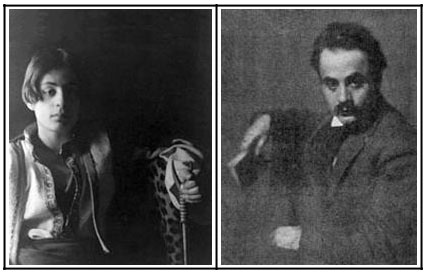Kahlil Gibran
Khalil Gibran was a Lebanese American artist, poet, and writer. He was born in the town of Bsharri (modern-day Lebanon) on January 6, 1883. His mother Kamila, daughter of a priest, was thirty when he was born; his father Khalil was her third husband. As a result of his family's poverty, Gibran received no formal schooling during his youth. Gibran's father initially worked in an apothecary, but due to gambling debts he found work within the Ottoman government to improve his financial lot. A later embezzlement scandal led to the father’s imprisonment. Kamila took her family, Khalil, and daughters, Mariana and Sultant, to America (1895). The Gibrans settled in Boston's South End, at the time the second largest Lebanese-American community in the U.S. Due to a mistake at school, he was registered as Kahlil Gibran. Khalil studied art and later met the avant-garde Boston artist and publisher Fred Holland Day who encouraged Khalil’s creative talents. Some of Gibran's drawings became book covers. At the insistence of his Mother, Kahlil, age 15, returned to Beirut to study at a Maronite-run preparatory school and institute. He started a student literary magazine with a classmate and was elected "college poet". In 1902 Kahlil returned to Boston. Two weeks before his return, his sister Sultana died of tuberculosis at the age of 14. The next year his mother died of cancer. His sister Marianna supported Kahlil and herself by working at a dressmaker’s shop. In 1918 the Alfred A. Knopf company published Gibran's first book called The Madman. In 1923 his best-know work was published – The Prophet. Gibran's writings of mystical Christianity and spiritual love were influenced by Christianity, Islam, Sufism, Hinduism and theosophy. He wrote : "You are my brother and I love you. I love you when you prostrate yourself in your mosque, and kneel in your church and pray in your synagogue. You and I are sons of one faith - the Spirit." The Prophet became extremely popular in the 1960s counterculture and New Age movements. Since its first publishing The Prophet has never been out of print and has been translated into more than forty languages. Gibran is the third best-selling poet of all time, behind Shakespeare and Lao-Tzu. One of his most notable lines of poetry is from "Sand and Foam" (1926), which reads: "Half of what I say is meaningless, but I say it so that the other half may reach you". This line influenced part of John Lennon’s lyrics for the song ‘Julia’ (‘The White Album’, 1968). Gibran died in New York City on April 10, 1931. According to his wishes, he was buried in Lebanon at the Mar Sarkis Monastery, which has since become the Gibran Museum. American royalties of his works are willed to his hometown of Bsharri, to be "used for good causes". z
|
